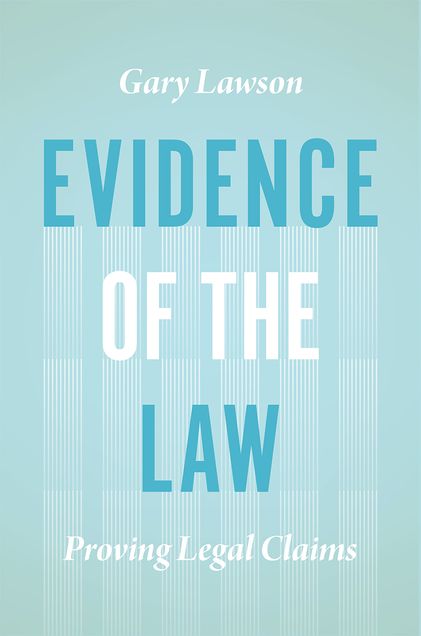Distinguished Legal Scholars Discuss Evidence of the Law: Proving Legal Claims
Philip S. Beck Professor of Law Gary Lawson’s new book advances the way we think about the law.
 On Friday April 14th, students and faculty gathered at Boston University School of Law to celebrate the publication of Evidence of the Law: Proving Legal Claims by Philip S. Beck Professor of Law Gary Lawson. The symposium, mediated by BU Law Professor Robert Sloan invited three noted scholars—Lawrence B. Solum, Carmack Waterhouse Professor of Law at Georgetown University, Scott Brewer, professor of law at Harvard University Law School, and Hugh Baxter, professor of law and professor of philosophy at BU—to comment upon the book.
On Friday April 14th, students and faculty gathered at Boston University School of Law to celebrate the publication of Evidence of the Law: Proving Legal Claims by Philip S. Beck Professor of Law Gary Lawson. The symposium, mediated by BU Law Professor Robert Sloan invited three noted scholars—Lawrence B. Solum, Carmack Waterhouse Professor of Law at Georgetown University, Scott Brewer, professor of law at Harvard University Law School, and Hugh Baxter, professor of law and professor of philosophy at BU—to comment upon the book.
Evidence of the Law examines the elements of proof when looking at the law itself and particularly poses the question of how sure one must be when making a claim about the law. The book focuses on a puzzling difference between the legal system’s treatment of factual and legal claims: Although standards of proof, and other features of proof, exist for factual claims in legal proceedings (requiring proof of facts beyond a reasonable doubt in criminal cases, for example), no such explicit standards generally govern assertions about the law. This is strange, argues Professor Lawson, because all claims, whether factual or legal, are equally subject to proof.
Following an introduction by Dean Maureen A. O’Rourke, Professor Solum began by emphasizing the importance of Professor Lawson’s work. “Most of my career for the past 10 years has been devoted to working out, in my way, the full implications of many of Gary’s ideas,” Solum said. “He is a critical figure in contemporary constitutional theory, and constitutional originalism would not be what it is today without Gary Lawson.” Solum described the book as a crucial step forward for “legal epistemology,” or the study of how we acquire knowledge in the legal realm.
Professor Baxter praised Lawson’s work and spoke about the book’s exploration of the formal structure of proof, which he saw as its central contribution to legal scholarship. He noted that the concept, while largely abstract, serves to organize the particular rules about proof, which vary by location: Rules at the federal level differ from those at the state level, and so on. The central question, Baxter asked, is “why does American law have such an elaborate structure of rules governing the proof of facts, but an impoverished set of rules governing the proof of law?”
Professor Brewer focused on some of the philosophical questions raised by Evidence of the Law, and he emphasized the book’s “highest philosophical ambition”—to provide a universal account of the concept of truth by means of necessary conditions. He explained his own “logocratic” method for assessing the strengths and weaknesses of arguments about legal claims. Comparing his method with the five categories Lawson identifies as necessary conditions for proof (principles of admissibility, principles of significance, standards of proof, burdens of proof, and principles of closure), Brewer identified complementary and competing ideas in each work.
In his response, Professor Lawson thanked each commentator and briefly discussed his motivations for writing the book. He described the first time he spoke on a panel in the late 1980s, when he thought to himself: “how sure do I have to be that a claim is true for me to make said claim?” This question stayed with him as he wrote an essay titled “Proving the Law” in 1992, and then continued his research that blossomed into Evidence of the Law.
Reported by Matthew Fils-Aime (COM’17)
Related News
- Conferences & Lectures @ BU Law
- Professor Gary Lawson Provides a Toolkit for Proving the Law with New Book
- Two BU Law Professors Receive Boston University’s Highest Awards for Teaching
- Professor Pnina Lahav Honored with Lifetime Achievement Award